Rainer Maria Rilke
Twenty More Poems
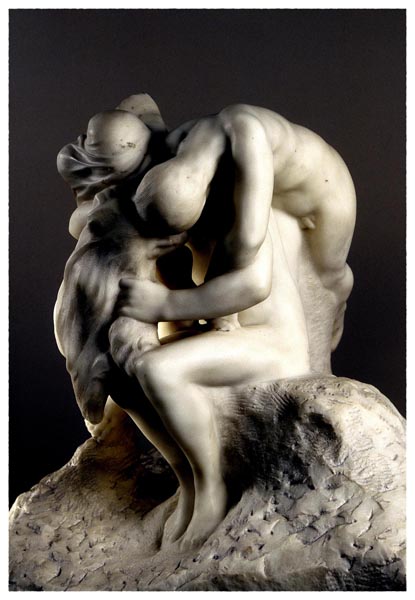
‘The Evil Spirits’ - Auguste Rodin (French, 1840 - 1917), The National Gallery of Art
Read more Rilke, with a commentary on the Elegies entitled The Fountain of Joy.
Translated by A. S. Kline © Copyright, All Rights Reserved. Made available as an individual work in the United Kingdom, 2004, via the Poetry in Translation website. Published as part of the collection ‘The Poetry of Rainer Maria Rilke’, ISBN-10: 1512129461, May 2015.
This work may be freely reproduced, stored and transmitted, electronically or otherwise, for any non-commercial purpose. Conditions and Exceptions apply..
Contents
- Lament
- Evening
- The Panther
- The Gazelle
- Before Summer Rain
- Early Picture of My Father
- Self-Portrait 1906
- Tombs of the Courtesans
- The Spirit Ariel
- Vast Night
- Turn of the Road
- Heart-Slopes
- Space
- Palm
- Always Again
- Endure
- Waiting
- Praise
- Elegy
- The Dove
- Index of First Lines
Lament
How far it all is,
And long gone by.
I believe that star
From which light glitters
Is a million years dead.
I believe, I heard
Something fearful said,
In the boat that floated by.
In the house a clock
Chimed…
In which house?…
I’d like to step out of my heart,
Beneath the vast sky.
I’d like to pray.
And one of all those stars
Must still remain.
I think I know
Which one
Has permanence –
Which one, like a bright city,
Stands, at the end of the sky’s radiance.
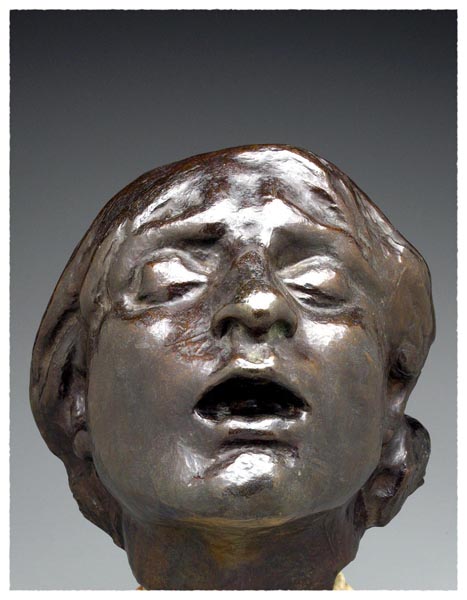
‘Head of Sorrow’ - Auguste Rodin (French, 1840 - 1917), The Yale University Art Gallery
Evening
Slowly the evening draws on its coat
Held out to it by a row of ancient trees:
You gaze: and the landscape splits in two,
One part lifting skywards, while one falls,
Leaving you not quite part of anything,
Not quite so dark as the house, the silent one,
Not quite as surely invoking the eternal,
As that which turns to star, each night, rising –
Leaving you (indescribably, to unravel)
Your anxious, immense, and ripening life:
So that, now bounded, and now grasped,
It becomes, in turn, stone in you, and star.
The Panther
(In the Jardin des Plantes, Paris)
His gaze is so wearied from the bars
Passing by, that it can hold no more.
It’s as if a thousand bars were given him:
And behind the thousand bars, no world.
The soft pace of his powerful, supple stride,
That draws him round in tightened circles,
Is like the dance of force about a centre,
In which a greater will stands paralysed.
Only, at times, the curtain of his pupils
Silently rises – Then an image enters,
Rushes through his tense, arrested limbs,
And echoing, inside his heart, is gone.
The Gazelle
(Gazella Dorcas)
Bewitched one: how can two chosen names
Ever achieve the harmony of rhyme
That comes and goes in you, as at a sign.
Out of your brow, branch and lyre climb,
And all you are already, in simile,
Passes through songs of love, whose words,
Soft as rose petals, rest across the eyes
Of one who, no longer reading, closes them.
And sees you: tensed, as if you were
A gun-barrel loaded now with leaps,
But not yet fired, while your neck still
Holds the head, listening: just as when,
Bathing in the woods, a bather attends:
The tree-fringed pool mirrored in her face.
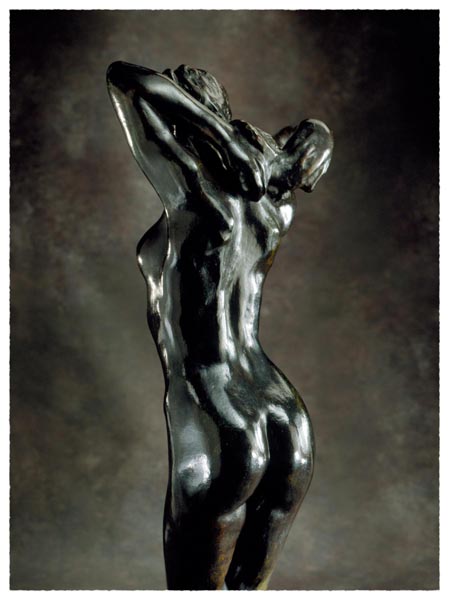
‘The Kneeling Female Faun’ - Auguste Rodin (French, 1840 - 1917), The Los Angeles County Museum of Art
Before Summer Rain
Suddenly from all the parkland’s green,
Something, who know's what, is withdrawn:
You feel it coming nearer to the window,
Silently being. Urgently, close and loud,
A plover whistles from the wooded field,
So you’d almost think it a Saint Jerome:
So much of passion and solitude’s rising
Out of that single voice, that the rain
Must hear. The walls of the living room,
With all their pictures, move away from us.
They aren’t allowed to hear what we say.
And mirrored by the faded tapestries,
Is that uncertain light of afternoon,
Where you are still afraid, like a child.
Early Picture of My Father
In the eyes, dream: The brow’s in touch
With something far. Vast youthfulness
In the lips, unsmiling seductiveness,
And below the highly ornamented braid
And the slim-chested noble uniform,
The sabre’s basket-hilt and both the hands –
Suspended, calm, and clasped on nothing,
And now almost invisible: as if they,
Grasping the distance, were first to vanish.
And all the rest is so self-involved,
So quenched, as if we can’t understand it,
And deeply clouded, from its proper depth –
You, swiftly disappearing photograph,
In my more slowly disappearing hand.
Self-Portrait 1906
Certainty there, in the eyelids’ shape,
Of some ancient, long-ennobled race.
Childhood’s anxious blue still in the eyes,
And here and there, humility, not a fool’s
Yet a servant’s though, and feminine.
The mouth’s, a mouth, large and exact,
Unconvinced, but speaking out for
Justice. The brow’s without guile,
Gladly gazing down to quiet shadows.
This, its context’s barely suspected:
Neither in adversity nor success
To gather to precise penetration:
Yet serious reality’s being planned,
As if with scattered Things, from afar.
Tombs of the Courtesans
There they lie, in their long hair,
Brown faces sunk deep in themselves.
Eyes as if fronted by too vast a distance.
Skeletons, mouths, flowers. In the mouths
Gleaming teeth like travelling chessmen
Set out there in their ivory rows.
And flowers, yellow pearls, slender bones,
Hands and tunics, shrivelled fabric,
Over decayed hearts. But there,
Below those rings, those talismans,
And jewels blue as eyes (lovers’ gifts)
The silent crypt of sex remains,
Filled to its arch with flower-petals.
And more yellow pearls, rolled about –
Bowls of fired clay, whose curves
Affect their portraits, green shards
Of ointment-jars, smelling of flowers,
And forms of little gods: household altars.
Courtesan-heaven, with delighted gods.
Broken belts, and shallow scarabs,
Tiny figures with vast genitals,
A smiling mouth, dancers and runners,
Golden clasps like little hunting bows,
Chasing after bird and beast amulets:
Long needles, decorated cutlery,
And a potsherd with a reddened ground,
Where like a dark inscription on an arch,
A four-horse chariot team’s limbs stiffen.
And more flowers, pearls, rolled apart,
The gleaming sides of a little lyre,
And, between the veils like falls of mist,
As if it crept from the shoe’s chrysalis,
The delicate butterfly of the ankle.
So they lie filled with Things,
Costly Things, gems, utensils, toys,
Smashed trinkets (how much fell into them!)
And they darken like a river-bed.
They were riverbeds,
Over them, in brief swift waves
(Willing themselves on to further life)
The bodies of countless youngsters plunged,
And the streams of grown men roared.
And sometimes boys, breaking from the hills
Of childhood, flowed in timid falls,
And played with sunken Things,
Until the slope captured all feeling,
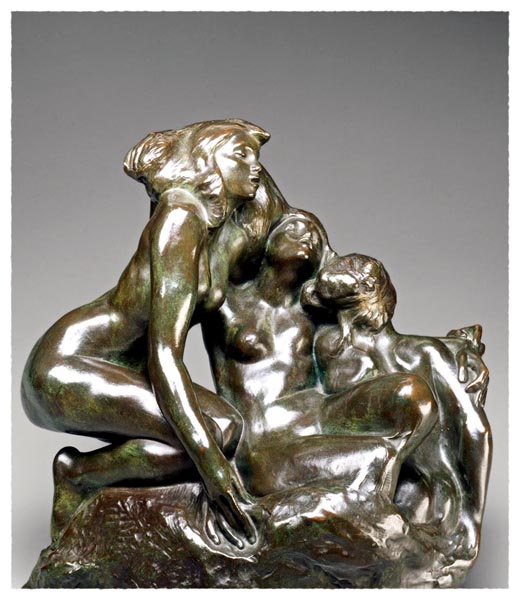
‘The Sirens’ - Auguste Rodin (French, 1840 - 1917), The National Gallery of Art
Then filled with clear shallow water
The whole breadth of the broad canal,
And stirred its whirlpools in the depths,
Mirroring the banks for the first time,
And far-off birdsong – while in the sky
The starry nights of a sweeter land
Opened on high, and would never close.
The Spirit Ariel
(On Reading Shakespeare’s Tempest)
Sometime, somewhere, you had set him free
With a jolt, with which we tear ourselves away
From youth, to greatness: from all consideration.
Then, he was willing: and since then he’s served,
Impatient, after every task, for freedom.
And half imperiously, half almost ashamed,
You put it to him you’ve still need of him,
For this and that, ah, and must tell him
How you helped him. And yet you feel yourself
That all that’s held back here, with him,
Is missing from the air. So tempting, sweet,
To let him go – and then, there’s no more magic:
Committing yourself to Fate like all the others,
Knowing that his weightless friendship,
Lacking strain, with no more obligation,
An excess of the space you breathe,
Works on, without thought, in the Element.
Dependent now, and no longer gifted
With shaping your dull mouth to the call
At which he dived. Powerless, ageing, poor,
Yet breathing him, like an incomprehensible
Far-flung fragrance, that makes the unseen
Complete. Smiling that you once could so
Summon him, used so easily to such
Great undertakings. Perhaps weeping too,
Remembering how he loved, and wished
To leave you, always both at once.
(Have I loosed him, already? This man, become
A duke again, terrifies me. How gently
He draws the wire through his head
And hangs himself beside the other
Figures, and brings forward his speech
And asks for mercy…What an epilogue,
Of consummate power. Throwing off, standing
Naked, with only one’s strength: ‘which is most faint’.)
Vast Night
I was often amazed by you, stood at the window begun
Yesterday, stood and was amazed. As yet the new
City was denied me, and the un-persuadable landscape
Darkened as though I were nothing. The nearest Things
Didn’t care if I understood them. And the street
Pressed on the lantern: I saw it was alien.
Over there – a room, sensed, clear in the lamplight.
Already I took part: they knew, closing the shutters.
Stood. And a child cried. I knew what the mothers
All around, in the houses, could do – and knew
As well the inconsolable root of all tears.
Or a voice sang out, and reached a little beyond
Expectation, or an old man below coughed
Full of reproach, as though his body was right
To oppose the gentler world. Then an hour struck –
But I began counting too late, and it fell past me –
Like a child, a stranger, finally allowed to play,
Who can’t catch the ball, no good at games
That the others all indulge in so deftly,
Stands there and stares – at what? Standing there, I
Suddenly grasped it was you surrounding me, playing,
Grown-up Night, and I wondered at you. Where towers
Raged, where, turned away from Fate, a city
Enclosed me, and un-guessed at mountains
Piled up against me, and strangeness, in narrowing
Circles, prowled around my random flickers
Of feeling – It was then, great one,
Unashamed yourself, that you knew me. Your breath
Passed over me. Your smile spreading across
Solemn distances, entered me.
Turn of the Road
(The path from inwardness to greatness
Passes through sacrifice. - Kassner.)
For ages he gained it by watching.
Stars fell to their knees
Beneath his struggling gaze.
Or he watched, kneeling,
And his urgency’s fragrance
Made some god so weary
It smiled at him in its sleep.
Towers he looked at so
They were startled:
Building them again, suddenly in an instant!
But how often the landscape
Over-freighted by day,
Was brought to rest, at dusk, in his silent awareness.
Creatures trusted him, wandering
Into his open gaze, grazing,
And the caged lions
Stared as if at ungraspable freedom:
Birds flew bravely
Straight through it: flowers
Gazed endlessly into it
Immense, as in childhood.
And the rumour a watcher existed
Moved the less,
More doubtfully, visible,
Moved the women.
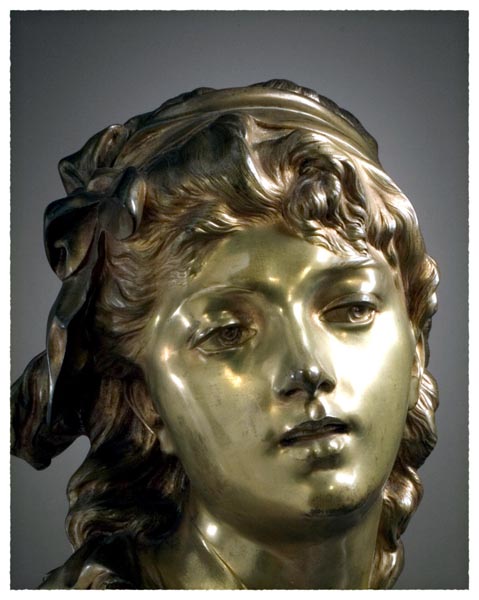
‘Suzon’ - Auguste Rodin (French, 1840 - 1917), The Los Angeles County Museum of Art
Watching for how long?
How long now, inwardly deprived,
Beseeching, from the depths of his look?
When he, one who waits, sat there in alien space:
The hotel’s distracted, un-noticing room,
Sullen, around him, and in the evaded mirror
The room again
And later, from the tormenting bed,
Again:
There in the air, considered,
Inconceivably considered
His perceivable heart
His through-the-painfully-buried body
Still perceivable heart
Considered and judged:
That it had no love.
(And refused him further communion)
For there’s a limit to gazing.
And the gazed-at world
Wants to blossom in love.
The work of vision is done,
Now do heart-work
On the forms in you that you’ve caught: since you’ve
Overpowered them: but still don’t know them.
Inner man, look on your inner woman,
The creature that’s won
From a thousand natures, the one
Gained just now, but not
Yet, truly, loved.
Heart-Slopes
Out on the heart-slopes. See, how tiny down there,
See, the last village of words, and higher,
But how little still, one last
Farmhouse of feeling. Do you know it?
Out on the heart-slopes. Stone ground
Under the hands. Something still
Grows here: on a dumb ledge,
An unknowing plant blooms, sings out.
And the knower? Ah, who began to know
And is silent now, out on the heart-slopes.
There fully conscious many a mountain
Creature, sure-footed, lingers,
Passes. And a huge bird securely
Circles the pure peak of denial – But
Insecure, here on the slopes of the heart…
Space
What birds fall through is not customary
Space, where forms increase for you.
(Out there, you’d be denied yourself
And you would disappear, without a trace.)
Space reaches out of us, and translates Things:
For a tree’s Being to succeed for you
Throw inner space around it, from that space
You know inside yourself, Surround it with constraint.
It has no boundaries. Not till it’s formed
By your renunciation is it ever truly ‘tree’.
Palm
Hand’s inwardness. Sole, that no longer walks
Except by feeling. That holds itself out
And in its mirror receives
Celestial roads, that wander
Along themselves:
That has learned to walk on water
When it scoops:
That travels from fountains
Transforming every path:
That steps into other hands,
Making a landscape
Of those that resemble it,
Wanders and enters them,
Filling them full of arrival.
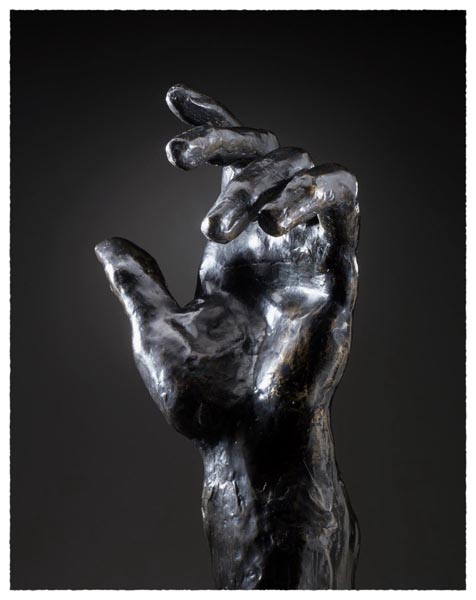
‘Left Hand of Pierre de Wissant’ - Auguste Rodin (French, 1840 - 1917), The Los Angeles County Museum of Art
Always Again
Always again, though knowing love’s landscape,
And the tiny churchyard of plaintive names,
And the ravine where others end, where terrible
Silence reigns – always again we go out, together,
Under the ancient trees, always again we lie,
Among flowers, face to face with the sky.
Endure
Are not Nights formed out of the painful space
Of all the embraces a lover suddenly loses?
Eternal beloved, you who wish to endure: give
Yourself out like a fount, enclose yourself like laurel.
Waiting
Beside the sun-drenched roadway,
In the cleft tree’s hollow, a trough,
So long, whose dripping surface
Quickly renews, I’ll quench my
Thirst: the source and play of water
Penetrates right through my wrists.
Drinking would seem too much to me,
Too clear: But this gesture brings
Glittering water to consciousness.
So, if you came to me, I’d need, to sate me,
Only the lightest touch of my two hands
Over the fresh young curve of your shoulders,
Over the swelling of your breasts.
Praise
O tell me Poet what you do? – I praise.
But the deathly and the monstrous,
How do you accept them, bear them? – I praise.
But the nameless, the anonymous.
How, Poet, can you still invoke it? – I praise.
Under every costume, every mask of us,
What right have you to be true? – I praise.
Or that the calm and the impetuous
Should know you, as star and storm? – Because I praise.
Elegy
(To Marina Tsvetayeva)
Oh the losses in All, Marina, the falling stars!
We can’t add to it, wherever we hurl ourselves
To whatever star! All is already a part of the whole.
So even when we fall, the sacred sum’s not lessened.
Whoever’s given to feeling falls to the source and is healed
Is it all a game, equal exchange, displacement,
Nowhere a name, nowhere natural achievement?
Waves, Marina, we’re sea! Depths, Marina, we’re sky.
Earth, Marina, we’re earth, a thousand times Spring,
Like larks an outpouring of song hurls to the unseen.
We begin as joy: it already utterly exceeds us:
Suddenly our weight bows the song down to lament.
But then: lament? Isn’t that a younger, deeper joy.
Even the gods of the deep wish to be praised, Marina.
Gods are so innocent they wait for praise like children.
Praising, dear one, let’s be generous with praise.
Nothing is ours. We set our hands lightly on the necks
Of unbroken flowers. I saw it at Kom Ombo, on the Nile:
Thus, Marina, those kings offered up gifts they renounced.
As angels mark the doors of those to be saved,
We touch this and that, seemingly tender.
Ah how far off already, ah how careless, Marina,
Even in our innermost pretences. Signposts that’s all.
This gentle commerce, when it no longer suffers
One of our kind, seizes them in its grasp, takes
Its revenge and kills. That it has power to kill
Was clear to all from its delicacy and restraint
And from the strange force that alters us
From living ones to survivors. Non-being. Do you
Remember how often blind command dragged us
Through the icy ante-room of birth…Dragged: us? A body
With eyes under countless eyelids, refusing. Dragged
That heart, a whole race, set down in us. Dragged
To the goal of migratory birds the flock, the form of our
Imminent change. Lovers, Marina, weren’t, are not
Permitted to know utter destruction. Must be as if new.
Only their grave is old, only their grave remembers,
Darkens under the sobbing tree, remembers it all.
Only their grave sinks: they are supple as reeds:
What bends them too far, weaves them richly in garlands.
How they flower on May winds! From the midst of Ever,
Where you breathe and sense, the instant shuts them out.
(O how I comprehend you, feminine flower on the same
Undying stalk. How strongly I scatter myself
Into the night air that will soon reach you) The gods
Long ago learnt how to simulate halves. We, drawn into
That orbit, filled ourselves out like the orb of the moon.
Even in times of waning, even in weeks of change
Nothing could ever again help us to richness, but our
Own solitary passage over the unsleeping landscape.
The Dove
(To Erika, for the Festival of Praise)
Far from the dovecote the dove that remains outside,
Finding its home again one with the day and night,
Knows real serenity since all its deepest fright’s
Touched by relatedness throughout its furthest flight.
Those doves below, the ones utterly cared for,
Never-endangered ones cannot know tenderness:
Hearts that are won again are the most lived-for:
Free through renouncing joyful in skilfulness.
Over all Non-being arches the Everywhere!
Ah now the far-flung ball, thrown if we truly dare,
Doesn’t it fill our hands returning, otherwise:
Weighted by homecoming more the prize.
Index of First Lines
- How far it all is,
- Slowly the evening draws on its coat
- His gaze is so wearied from the bars
- Bewitched one: how can two chosen names
- Suddenly from all the parkland’s green,
- In the eyes, dream: The brow’s in touch
- Certainty there, in the eyelids’ shape,
- There they lie, in their long hair,
- Sometime, somewhere, you had set him free
- I was often amazed by you, stood at the window begun
- For ages he gained it by watching.
- Out on the heart-slopes. See, how tiny down there,
- What birds fall through is not customary
- Hand’s inwardness. Sole, that no longer walks
- Always again, though knowing love’s landscape,
- Are not Nights formed out of the painful space
- Beside the sun-drenched roadway,
- O tell me Poet what you do? – I praise.
- Oh the losses in All, Marina, the falling stars!
- Far from the dovecote the dove that remains outside,